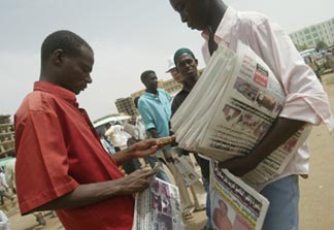Sudan’s daily raps authorities over seizure of its copies
August 7, 2011 (NAIROBI) – A Sudanese daily has protested the confiscation of its copies by the country’s security forces on Sunday, saying it incurred a heavy financial loss as a result.

Sudan frequently confiscates and censors newspapers despite the fact that the country’s constitution upholds freedom of speech.
Independent and pro-opposition publications in particular continue to chafe morally and financially under these measures which are often carried out without any legal framework.
The country’s president Omer Al-Bashir promised in a speech before the parliament on 12 July that freedoms and rule of law would prevail in his country’s “second republic” following the secession of South Sudan.
Ironically, few days later the authorities ordered the closure of several newspapers on the pretext that their owners are southern Sudanese.
Mozdalifa Mohamed Osman, head of al-Ahdath’s newsroom, deplored the seizure as representing “a withdrawal” on the president’s promises of a new republic characterized by freedoms and rule of law.
She told Sudan Tribune that the confiscation of the paper’s copies was unexplained and done without legal procedures.
The title’s chief news editor said that if the newspaper had done anything deserving of punishment, such punishment should have been carried out in accordance with the law. “Unfortunately the confiscation was done without reasons,” she said.
“The era of confiscations and constraints is supposed to be over,” she added in reference to the president’s claims.
According to Mozdalifa, the paper’s failure to publish had cost it more than 25,000 Sudanese pounds [approximately 10,000 US dollars].
Al-Ahdath, which started publishing in 2007, was one of ten papers that suspended publication for one day to protest against the arrest of journalists who demonstrated against censorship on 18 November 2008.
Sudan’s print-media enjoys relative freedom in compare to broadcast-media which is tightly controlled by the state.
In September 2009, president Al-Bashir warned newspapers against publishing any content that crosses “the red-lines” which he defined in anything “undermining the nation, its sovereignty, security, values and morality”.
International press freedom organizations have in the recent past criticized the way Sudan curtails freedom of its newspapers and targets individual journalists through legal proceedings.
Reporters Without Borders, a Paris-based press-freedom watchdog, in June lamented “the disgraceful way the [Sudanese] authorities are harassing and prosecuting journalists in Khartoum and the north of the country in an attempt to silence them and stop embarrassing revelations about human rights violation by the security forces”.
Also in June, the Committee to Protect Journalists (CPJ), a New York-based advocacy group, said that Sudanese authorities continue to “aggressively” target individual journalists and publications through “contrived legal proceedings, politicized criminal charges, and confiscations”.
Results published as part of UNESCO 2011 World Press Freedom Day, Sudan ranks as 40 out of 48 in Sub-Saharan Africa for press freedom. Amnesty International described Sudan as a place where freedom of speech is being “openly violated”.
(ST)
